Rechercher
Affichage de 1950 à 1965 sur 3126 actualités
-
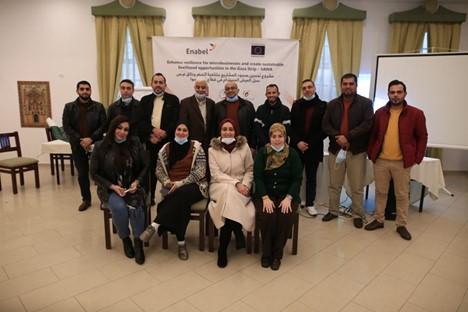
SAWA project completed the first phase of their partners’ capacity of building program
Roula HANDAL | 10/06/2021
As a step forward towards ensuring the sustainability of SAWA project, we have completed the first phase of building the capacity of our partners in the field of community-based micro-business development services and Monitoring, Evaluation, Accountability and Learning (MEAL).SAWA partners were able to update their business development systems, structures, policies, producers, and manuals. They will also provide community-based business development services while applying relevant MEAL system, which can help in measuring the progress and impact of SAWA project on the beneficiaries and community levels.
-
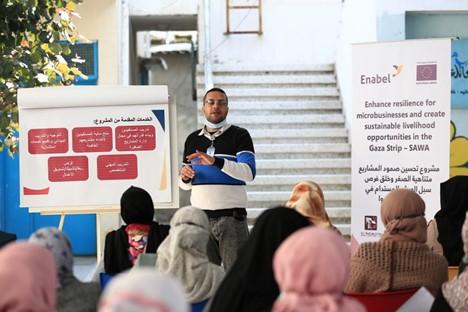
SAWA Project conducted sensitization sessions to outreach women and youth
Roula HANDAL | 10/06/2021
In February, SAWA project and partners (Bayader and Woman's Affairs Centre) have successfully implemented 56 sensitization sessions for women and youth. The first group of sessions were organized in the most vulnerable communities in the Gaza strip. The focus of the session was to encourage the communities to apply for financial and non-financial services in the frame of sustainable livelihood opportunities. More than 1200 women and youth attended the sensitization sessions that were facilitated by SAWA team and implementing partners. SAWA received a total of 24,950 applications.The second group of the sensitization sessions was a preparatory step before conducting the Go-green Hackathon. SAWA team and the Palestinian Federation of Industries (PFI) conducted 8 sessions with universities and technical colleges. The sessions presented and disseminated the key challenges of the green and circular economy within the industrial sector. During the sessions, 300 youth (120 Male, 180 Female) have gained a better understanding of the green challenges, which will serve as a starting point for solution and idea generation to compete in the hackathon. SAWA received a total of 395 applications with ideas to participate in the hackathon. The Go-Green hackathon will take place at the beginning of April. It will be the first Hackathon in Palestine that deals with green and circular economy challenges within the industrial sector.
-
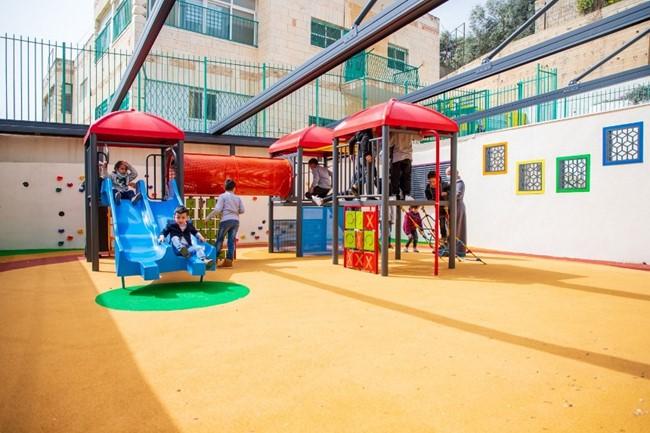
RiSE project finalized rehabilitation works in 3 schools
Roula HANDAL | 10/06/2021
In Al-Hasan Al-Thany school, Wadi Al-Joz, the space for a Fablab with an external working area was created. In this Fablab the students will receive technological, innovative, and creative training where they can further develop their 21st Century skills.In Al-Rawdah Al-Haditha, the only public school located in Zaayem suburb, a school extension was built to create 6 much-needed additional classrooms and a counselor room. Until now, the school was mixed only up to 8th grade and girls-only upwards, leaving teenage boys with no option to complete their education locally and leading to a high school drop-out. The new extension will allow them to complete their curriculum from kindergarten to grade 12 within the same school.In Jabal Al-Mukabber a kindergarten unit was created. With an education in East Jerusalem under constant pressure and ever-increasing threat, offering free early childhood education within Palestinian public schools is a key element to ensure the freedom of choice to follow one’s curriculum and narrative from the start. The whole school, together with 9 extra schools selected for the RiSE project, will be further rehabilitated in 2021.
-
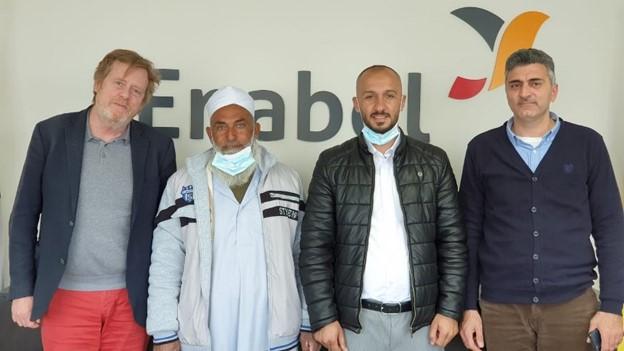
The upgrading of Khalet al-Maya village council to a municipality
Roula HANDAL | 10/06/2021
The Minister of Local Government Eng. Majdi Al-Saleh has approved the upgrading of Khalet al-Maya Village Council to a municipality. The approval came as a result of the successes and joint efforts of Enabel, through the Local Government Reform and Development Program (LGRDP II) - Area Resilience Development (ARD) Initiative and the Association of Netherlands Municipalities, with the support of the European Union.The joint efforts aimed to:- strengthen cooperation and integration between the six villages in marginalized areas and those in Area C and Area B,- strengthen the resilience of citizens by improving service provision and the performance of local authorities,- promote community and women's participation in the decision-making process."The transition to a municipality is an important achievement for Khalet al-Maya region. We thank all those who have contributed, participated, and supported this journey, especially our citizens in the six villages. They are the real capital and partners of change," said Majdi Al-Adra, Mayor of Khalet al-Maya.Over the past three years, the partners have implemented a large number of activities and projects, aiming at establishing and enhancing the local council services provided to local citizens.
-
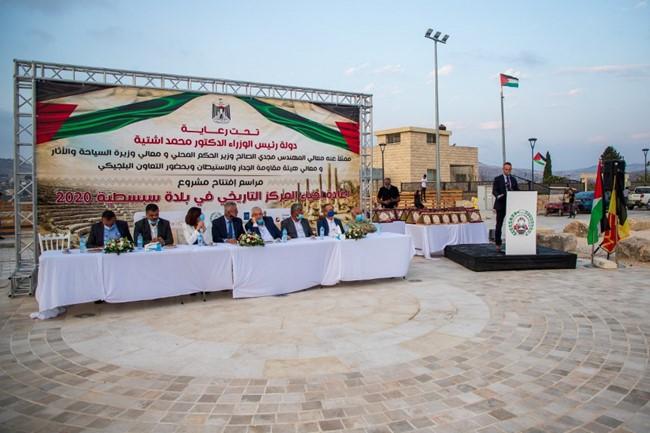
The inauguration of Sabastiya Basilica square and its surroundings
Roula HANDAL | 10/06/2021
Sabastiya village celebrated the inauguration of the Basilica Square “Al Baydar” and its surroundings. The celebration was under the patronage of the Palestinian Prime Minister and attended by; the Minister of Local Government, the Minister of Tourism and Antiquates, Deputy Consul General of the Consulate General of Belgium, Resident Representative of Enabel and other Palestinian Authority officials along with Sabastya village representatives.The Basilica Square has a cultural and historical inheritance and is considered a touristic attraction point in Palestine and listed on the preliminary list of world heritage sites.The rehabilitation project also included the installation and operation of 9 Kiosks to function as traditional Palestinian products and services kiosks: crafts, mosaic, traditional Sweets, traditional clothes, traditional food, kids supplies, ceramics, and homemade food kiosks. Such kiosks will increase the level of attraction to the historical area by offering products and services to visitors and tourists, hence develop the local economy.The rehabilitation project was funded by the Government of Belgium through Enabel’s Regeneration of Historic Centres (RHC) programme and the Local Government Reform and Development (LGRDP – Phase II) programme.
-
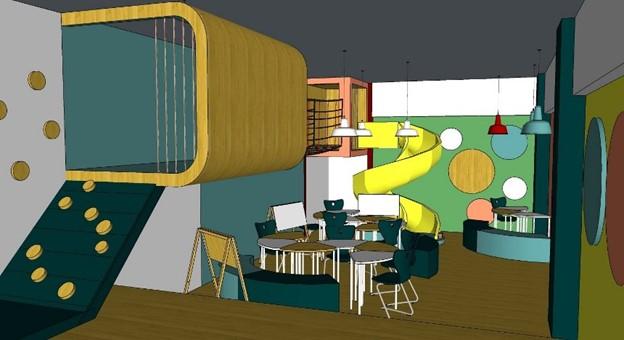
Rehabilitation, transformation and extension works in three Waqf schools in Jerusalem and Zaayem
Roula HANDAL | 10/06/2021
For the Resilience in Schools of East Jerusalem (RiSE) project, and notwithstanding the current Covid-19 crisis, Enabel is implementing rehabilitation, transformation and extension works in three Waqf schools in Jerusalem and Zaayem this summer 2020. These works, funded by the European Union and Belgium, will allow the creation of a kindergarten, a FabLab and additional classrooms. The creation of a kindergarten is highly needed since there are not sufficient Waqf kindergartens in Jerusalem.In Zaayem there are no public secondary schools for boys. Additional classrooms will be built on top of the only existing school, so that teenage boys don't need to cross a checkpoint anymore to reach their schools.In Wadi al-Joz the first FabLab will be installed, making it our pilot for their creation in other schools. FabLabs are digital fabrication laboratories where you can innovate and develop almost anything by using advanced technology and 21st-century skills. The installed FabLabs will be accessible for multiple schools making it a creative space for young students to collaborate and create.
-
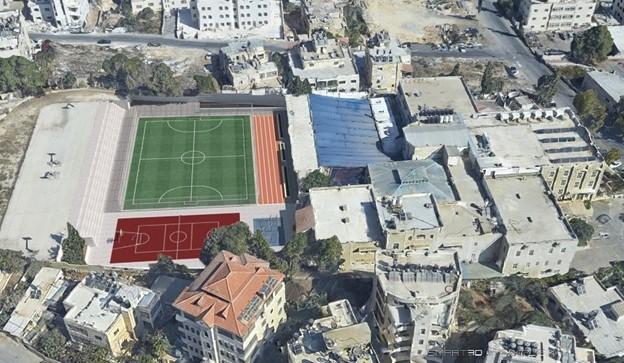
Semi-public sports field in Collège des Frères de la Salle
Roula HANDAL | 10/06/2021
In the framework of Resilience in Schools of East Jerusalem (RiSE) project, Enabel is currently implementing a semi-public sports field in Collège des Frères de la Salle in Beit Hanina. The space will feature a football pitch, a basketball court, running tracks and an outdoor gym area with necessary amenities that will be used by the students during school hours and will be open to the community the rest of the time. This project is funded by the European Union and Belgium.
-
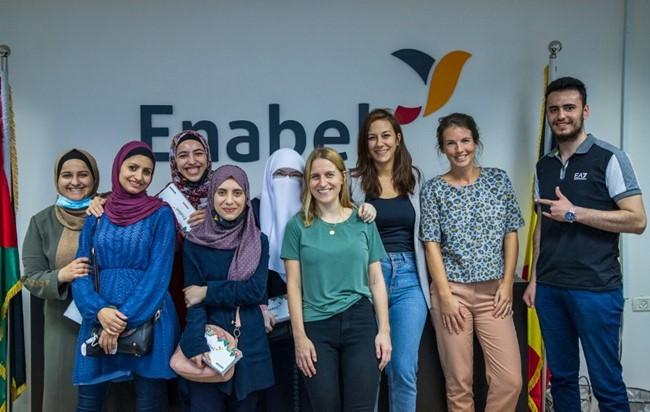
Skilled 4 Future Camp (S4F)
Roula HANDAL | 10/06/2021
The project Skilled Young Palestine successfully conducted the Skills4Future camp. This virtual -day event shed a light on the importance of 21st Century Skills, including digitization, and entrepreneurship for Palestinian youth as a way to build resilience. The camp targeted both youth and Civil Society Organisations from Gaza, West Bank and East Jerusalem.Facilitators from different organisations both in Palestine and at the international level were carefully selected, based on their expertise in the field of 21st-century skills. As a way of incentivizing participants, prizes were foreseen to award the most active participants. For winning youth, tablets were foreseen and Civil Society Organisations were subscribed to a workshop on how to organise interactive and fun webinars.In 2021, the project will further support 21st-century skills development in innovation hubs in Palestine.
-
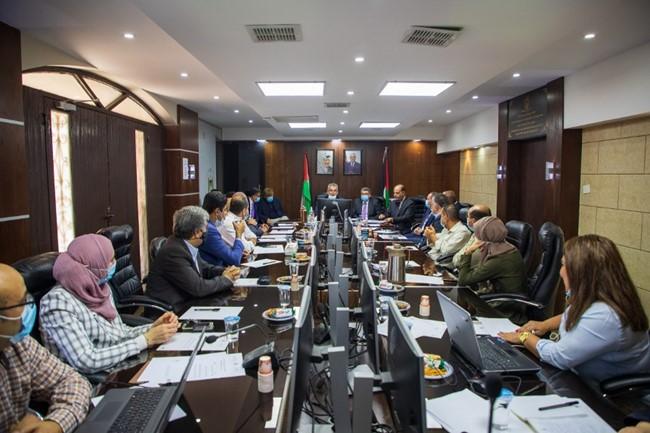
Launching of Ministry of Local Government online Budget System
Roula HANDAL | 10/06/2021
Enabel and the Ministry of Local Government (MoLG) celebrated the “Budgeting online Portal System” launching. The System will serve both the Ministry of Local government and the Local Government Units (LGUs) by submitting their budgets to the Ministry online.The budgets will be reviewed by the budgeting department staff at the MoLG, and reports can be easily generated with accurate information and easy access.Such support will benefit the MoLG sustainability, improve work quality, and digitalize its procedures and function. The online portal came as a result of Enabel’s efforts and previous interventions through the provision of an archiving and filing system, enhancing the servers, equipment supplies, and improving the Human Resource systems.
-
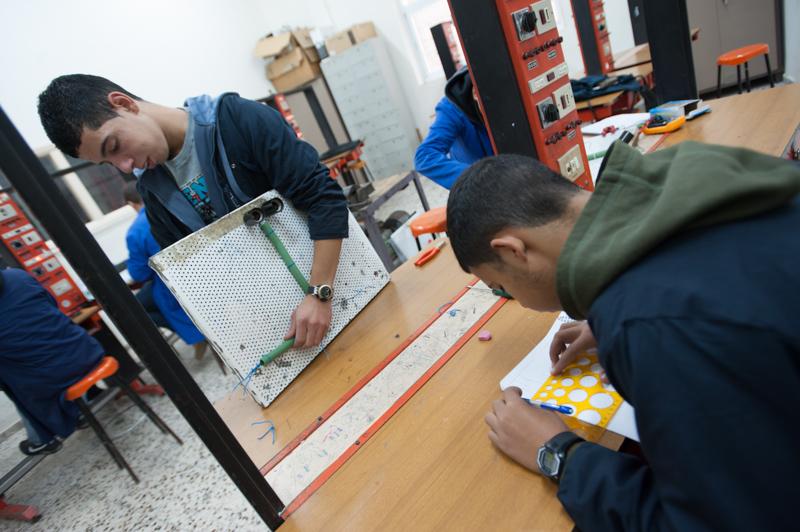
Inception phase for Skilled Young Palestine (SYP)
Roula HANDAL | 10/06/2021
The project Skilled Young Palestine officially started in the beginning of 2020. During the inception phase, two studies were conducted in order to better target the intervention. Meta-analysis of the labour market in Palestine The study provides insight in the needs of the labour market in Palestine, by giving an overview of sectors, trades and corresponding demand for vocational and 21st century skills, that hold potential for (self-)employment for youth in Palestine. The study shows the effect of the challenging political situation and Covid-19. They have an unmistakable impact on the economic situation in Palestine, and on the needs of the private sector. Are you interested in the findings? Contact us to receive the report. Mapping of the innovation eco-system in Palestine The report reviews the eco-system of innovation hubs in Palestine, by providing data on existing hubs (type, services, facilities etc.), and analysing their quality and effectiveness. The findings of the study will be used to decide how to fill the void and skills gap regarding innovation and 21st century skills in Palestine. The study shows that there is a need to invest in remote areas, so to have a better outreach to vulnerable youth. Do you want to find out more? Contact us to receive the report.
-
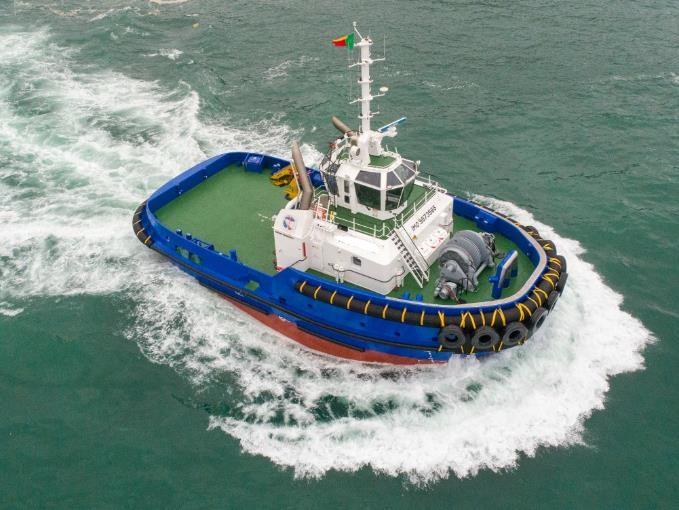
Au Bénin, une nouvelle ère de modernité, de compétitivité et de productivité s’ouvre sur le Port de Cotonou
Reece-hermine ADANWENON | 09/06/2021
L’un des deux nouveaux remorqueurs commandés par le Port Autonome de Cotonou (PAC), est entièrement achevé. Il a pris départ le 31 mai 2021 au Vietnam du chantier naval de Damen et son arrivée à Cotonou est prévue pour fin-juillet. Cet appareil de dernière génération de type ASD de 85 tonnes offre une aisance confortable dans les manœuvres pour l’accostage, l’appareillage et le déhalage des navires de grandes dimensions. Enabel au Bénin à travers son Projet PASport (Projet d’Appui au développement du Secteur Para-Portuaire) s’associe aux autorités portuaires pour assurer la formation des pilotes de remorqueurs et assimilés pour l’appropriation des nouvelles techniques de manœuvre des remorqueurs de ce type. En construction sur le chantier naval de Damen au Vietnam depuis l’année dernière l’un des deux remorqueurs commandés par le PAC est entièrement achevé et est parti du Vietnam le 31 mai 2021 en direction de Cotonou. Ce remorqueur de type ASD est doté d’une force de traction de 85 tonnes. C’est une machine de dernière génération identifiée pour sa robustesse et sa puissance qui s’arriment parfaitement aux besoins actuels du Port de Cotonou. Pour rappel, cette acquisition est une grande première dans l’histoire du PAC et s’inscrit dans le vaste chantier de modernisation et de rénovation des infrastructures et équipements entrepris depuis trois ans. Un maillon essentiel du projet n° 1 du plan directeur 2021-2025, visant l’accueil en continu des navires de grandes dimensions, la réduction du temps d’attente des navires en rade, la célérité des opérations et par ricochet, l’accroissement de la productivité. Dans l’opérationnel, le PAC vient d’opérer un renforcement logistique de taille qui contribuera sans nul doute à pallier les pannes récurrentes et autres carences observées au niveau du parc des engins flottants. Une formation des pilotes de remorqueurs et assimilés pour l’appropriation des nouvelles techniques de manœuvre des remorqueurs de ce type est prévue et sera financée par Enabel Bénin dans le cadre de son projet PASport. Notons qu’il ne faudra pas attendre longtemps pour accueillir le second remorqueur qui devra prendre départ du Vietnam courant fin juin et rallier Cotonou probablement vers fin août.
-

Agir pour les jeunes et par les jeunes ! Florence EGOU, une « Girl lead change »
Reece-hermine ADANWENON | 04/06/2021
Au Bénin, les adolescents et jeunes ont un faible accès à l’information et aux services adéquats pour la Santé Sexuelle et Reproductive. Cela se traduit dans les statistiques et indicateurs peu reluisants. Ainsi, en 2017, on dénombrait 819 grossesses précoces chez les adolescentes et jeunes au Bénin dont 117 en milieu scolaire. On observait également 97 cas de mariages forcés et 312 cas de Violences Basées sur le Genre (VBG) chez les jeunes de 15-24 ans. Les causes sont multiples : un environnement familial défavorable marqué par l’absence de dialogue parents-enfants sur la sexualité, l'absence ou une faible éducation à la santé sexuelle en milieu scolaire et d’apprentissage, l'insuffisance de la protection des adolescents et jeunes contre toutes formes de violences basées sur le genre. Le programme d’appui à la santé sexuelle et reproductive et à l’information sanitaire (P@SRIS) vise l’amélioration de la jouissance des droits des femmes y compris les jeunes filles à travers la promotion de la santé sexuelle et reproductive des adolescent-e-s et jeunes. De février à mars 2021, le P@SRIS a donné aux jeunes filles et femmes adultes les moyens de se rendre autonomes tout en jouissant d’une intégrité corporelle saine. 30 filles et 15 femmes adultes issues des groupements et associations (pairs-éducatrices) ont été formées sur l’auto palpation des seins. Aussi, leurs capacités pour développer l’entreprenariat ont été renforcées à travers la formation sur la préparation du savon liquide. Outre les aspects économiques liés à cette formation, la disponibilité de savon liquide renforcera l’hygiène des mains et la lutte contre la COVID-19 (le savon liquide produit lors de la formation sera distribué au niveau des Centres Ados et Jeunes, collèges et centres d’apprentissage).Par ailleurs, afin de lutter contre les cas de viols, ces filles et femmes ont été outillées sur les techniques de l’autodéfense. La Direction Départementale de la Santé du Couffo, avec l’appui technique et financier du P@SRIS, a organisé la mise en place des Centres des Ados et Jeunes dans les 3 communes (Klouékanmey -Toviklin - Lalo) en prenant de suivre une démarche participative garantissant non seulement la pleine implication des bénéficiaires mais aussi la prise en compte totale de leurs besoins dans l’action. L’objectif visé est de faciliter l’accès des adolescent(e)s et jeunes aux services de qualité et adaptés à leurs besoins de santé et de développement. C’est un espace permettant la promotion des Droits de la Santé Sexuelle et Reproductive (DSSR) qui répond effectivement à un besoin dans les communes où chaque acteur est responsabilisé afin de contribuer à la pérennisation des activités. Au Bénin, Enabel s’associe au Ministère de la Santé pour promouvoir l’accès aux droits et à la Santé Reproductive des Adolescents et Jeunes (SRAJ). Le projet donne la parole aux adolescents et jeunes des collèges du Couffo et de l’Atlantique pour s’exprimer sur leur situation et agir. Allons à la découverte de Florence EGOU, une « Girl lead change » hors pair. Elève en 1ère D, âgée de 15 ans, elle œuvre pour la promotion des droits sexuels et reproductifs des Jeunes dans sa localité. Elle fait partie des filles qui mènent des actions de changement dans leurs communautés.
-
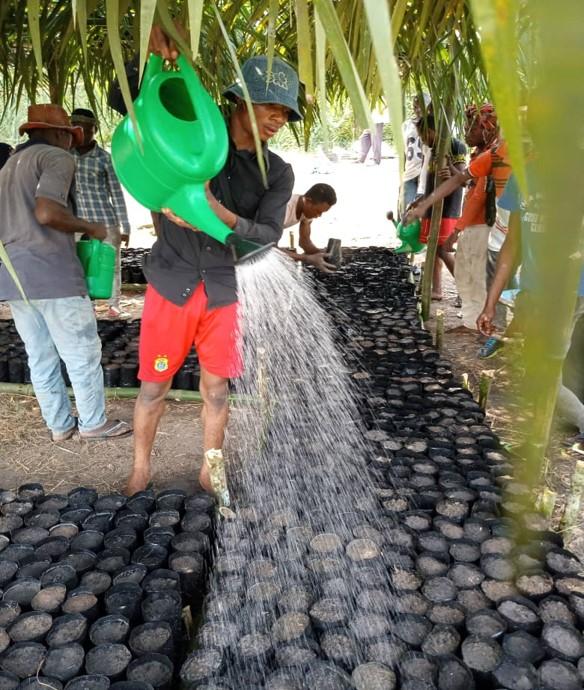
Valorisation et domestication des espèces Aframomum & Renealmia africana
Grâce MALI FAIDA | 03/06/2021
Une recherche-action portant sur la valorisation et la domestication des espèces Aframomum div.espèces (Tondolo) et Renealmia africana (Mundongo) dans la Province de la Tshopo à Yangambi . Ces deux espèces de la famille des Zingibéracées revêtent d’une importance alimentaire, économique, thérapeutique. Leurs fruits sont notamment utilisés dans la pharmacopée traditionnelle et moderne. La majorité d’espèces de la famille des Zingibéracées sont à l’état sauvage et sont en train de disparaître progressivement suite à l’exploitation des forêts et réserves naturelles. La domestication représente la façon la plus simple et durable de conserver ces espèces. Cette action est menée par le département de l’Environnement de l’Université de Kinshasa et financée et suivie par le Programme d’Etudes et d’Expertises (PEE).
-
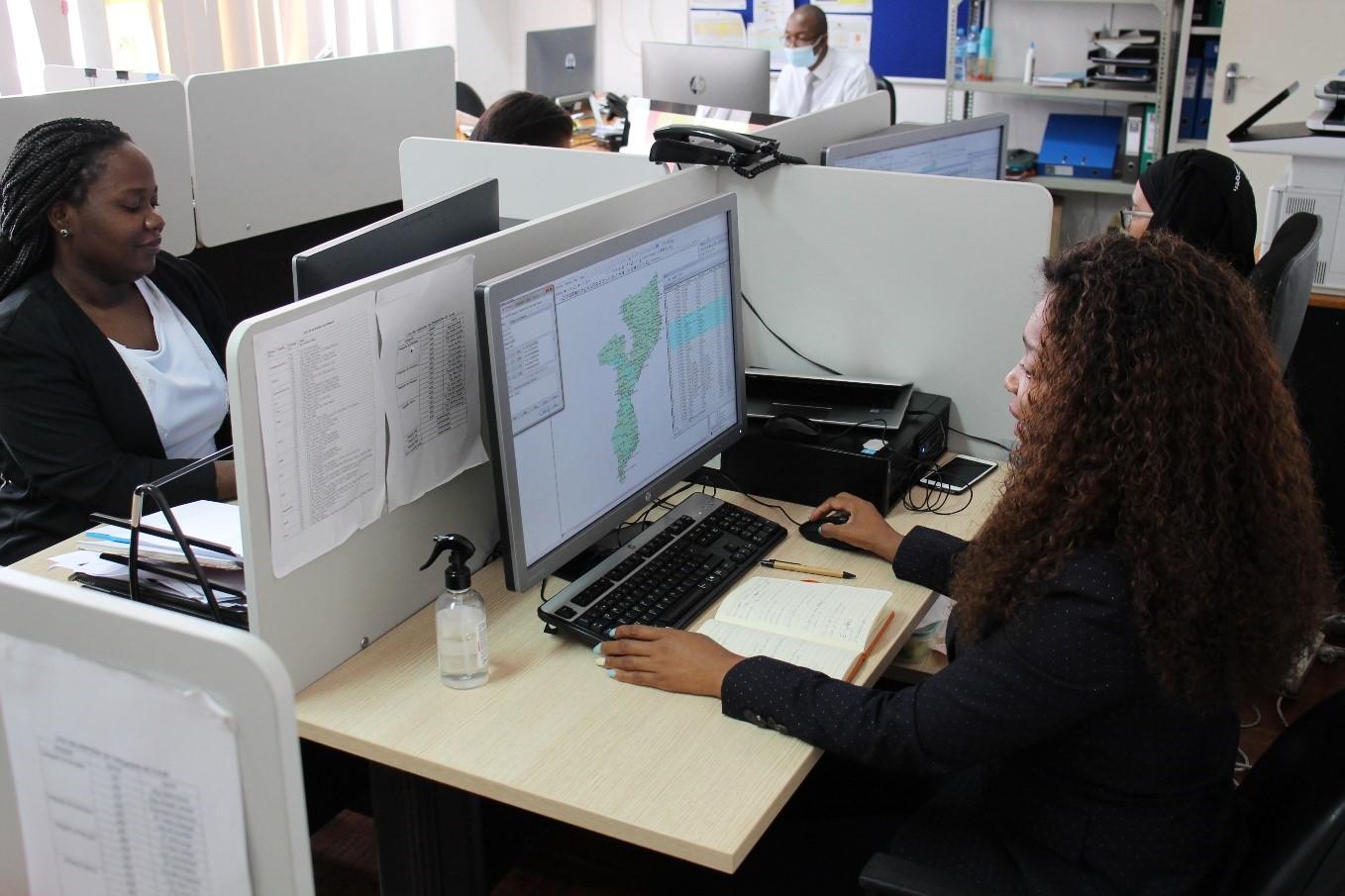
Rural electrification in Mozambique: how to find the right villages?
Akila MUNIR | 03/06/2021
By: Antoine DE CLIPPELE & Riccardo DEL CITTOMozambique has abundant resources for generating clean, accessible and sustainable energy. In 2011, the United Nations launched the Sustainable Energy for All (SE4All) initiative to ensure universal access by 2030 to modern energy services, double the global rate of improvement in energy efficiency, and double the share of renewable energy in the global mix. Although a wide range of socio-economic and environmental arguments are in favour of renewable energy systems, political and legal, technical and financial barriers generally persist. The electricity access in Mozambique in 2018 was estimated at 31.1%. In rural areas, however, this rate drops to 8.0% (World Bank[1]). Meanwhile, in November 2018, the Government of Mozambique launched the National Energy for All Programme to advance the country towards achieving energy access by 2030. The programme prioritises grid expansion and densification but also considers the role of off-grid, renewable energy-based solutions, especially in remote areas. Providing electricity to everyone in Mozambique requires considerable investments. Experience in Mozambique so far shows that the high number of stakeholders in the energy sector, their different interests and lack of coordination increases the risk of duplicating efforts and waste resources. A systematic and objective approach will facilitate coordination in off-grid energy planning. One of the tools available for planning is remote sensing. This allows us to systematically evaluate all the sites for off-grid electrification and determine which locations have the highest potential based on defined criteria and priorities. General planning based on estimates of population size and distribution, electrified areas, location of the national grid and socio-economic data will help prioritise the villages for electrification and determine which delivery technology should be used. Mozambique however faces the same data availability issues as many other countries in Sub-Saharan Africa. Very often, population data or national grid data are not available. This information does not exist or is not available due to the lack of collaboration between the different stakeholders. FUNAE, the National Energy Fund, is particularly concerned about this issue. Indeed, together with the Ministry of Energy and Mineral Resources (MIREME) and the Mozambican Electricity Company (EDM), these institutions need coordination to avoid duplication of effort in the field of electrification. While EDM works on the expansion and densification of the national grid, FUNAE is mandated to electrify the remote(r) areas with off-grid technologies. This, of course means knowing each other's presence in the national territory to avoid working in the same areas. FUNAE has so far been able to identify the most promising off-grid electrification sites due to its widespread presence at the provincial level. The standard approach involves intensive fieldwork, with constant deployment from delegation offices and from headquarters in the capital. However the risk remains that this approach does not take into account places that are more isolated and less well known by FUNAE and its partners. In 2020, this approach was further hampered by travel restrictions related to the Covid-19 pandemic. Through its Renewable Energy for Rural Development Phase II (RERDII) project, Enabel (the Belgian Development Agency), as a partner of FUNAE, proposed, among other solutions, the use of innovative geospatial technologies (GIS) to solve the problem of data availability. After analysing the best practices in other countries, a method was developed internally. The method addresses data scarcity by combining largely openly available data with the existing data in the institution. The idea behind the proposed method is simple: Firstly, we identify the location of population and the existing and planned national electrical grid. This will allow us to filter the villages with large and dense populations so far from the grid that they are unlikely to be connected to the national grid in the foreseeable future. For FUNAE, these two criteria (location of settlements and the national grid) are strategic. After mapping these as accurately as possible, it is still possible to complete the analysis by cross-referencing with other information, such as the location of schools and health centers, distance to major cities, population growth, household income, economic potential and potential productive uses of electricity. Both for the population and the electrical grid, only incomplete and outdated data is currently available in Mozambique. In order to approximate this data and carry out our analysis, we will therefore use alternative approaches. For population data, there are several open data initiatives to estimate the population of countries based on available census data, satellite images, statistical models, built-up areas… These initiatives provide population estimates with a resolution of 100m. This resolution is high enough to identify villages. The joint work in this area between the RERD2 project and the FUNAE Department of Research and Planning made use of GRID3[2]. As far as the data of the national grid is concerned, the lack of data can be compensated by remote sensing and satellite images. Based on night light and population data, we used the Gridfinder[3] model to determine the most probable path of the power lines. We then combined the modelled lines with the available data. By strengthening our cooperation with EDM, the national electricity company, we added the planned power lines to the map.Even though both datasets remain estimates, it is a significant improvement from the situation as it was. It can already be used as a starting point for planning the priority villages for off-grid electrification. After combining all this information, we can draw up a shortlist of villages and, thanks to the FUNAE delegation in each province, contact the local authorities of these places or villages. For the more promising villages, telephone surveys can be conducted to collect more information. Eventually, if the village seems to have sufficient potential, a site mission can be organised to confirm the information and prepare the next steps for electrification.During the application of the methodology conducted recently in two provinces, 14 sites were selected from an initial list of 53 submitted by the provincial FUNAE delegations while 13 new locations were identified that were not included in FUNAE's rural electrification plans. Data collection is now underway through telephone interviews on all priority sites. The potential of the most interesting villages will be verified through field surveys.Ultimately, the methodology described above leads not only to a systematic approach to rural electrification planning, but also to a reduction in the number of on-site missions. Indeed, these missions are resource-intensive and can have a significant impact on the availability of technicians for other tasks. Moreover, working through this method with the different stakeholders has also made it possible to address the issue of collaboration between the different institutions. Although there is still work to be done in this area, working on this method was an important step in raising awareness of the importance of enhanced collaboration in the energy sector. [1] https://data.worldbank.org/indicator/EG.ELC.ACCS.RU.ZS?end=2018&locations=MZ&start=2002&view=chart[2] https://academiccommons.columbia.edu/doi/10.7916/d8-37sa-gy34[3] https://gridfinder.readthedocs.io/en/latest/
-
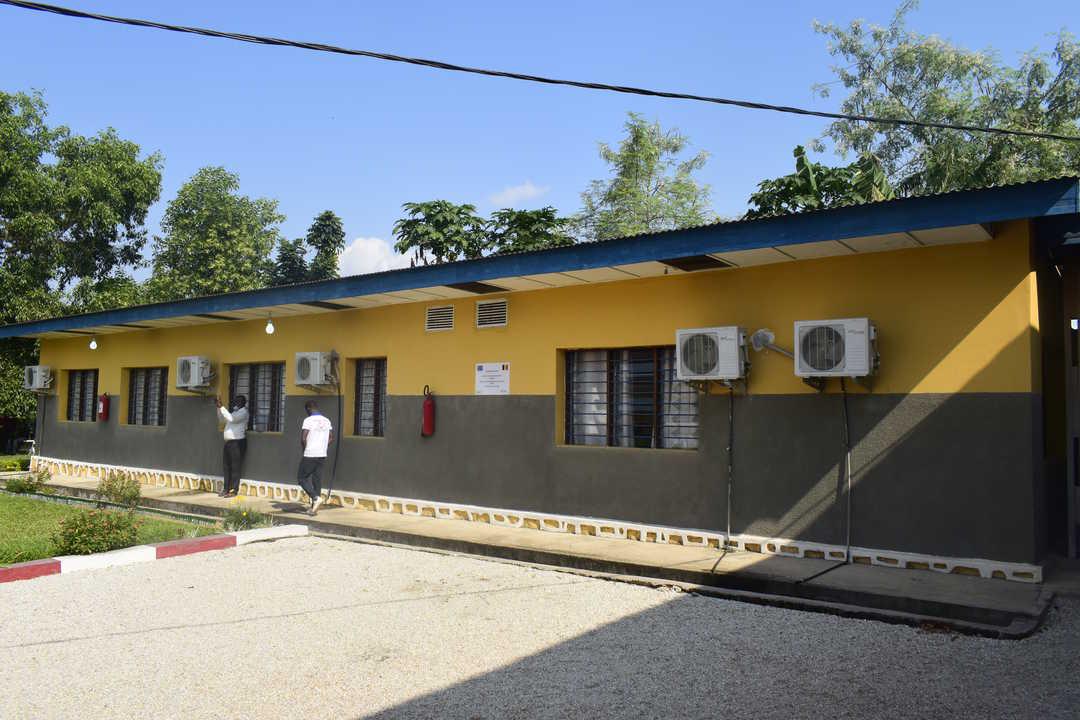
La CAMEKIS se dote de deux nouveaux bâtiments.
Grâce MALI FAIDA | 03/06/2021
La CAMEKIS (Centrale d’Approvisionnement en Médicaments Essentiels de Kisangani) situé dans la commune de MAKISO a réceptionné le mardi 26 mai deux nouveaux bâtiments construits avec l’appui du Royaume de Belgique, dans le cadre du Programme d’Appui au Niveau Central (PANC), mis en œuvre par Enabel, Agence belge de développement.Il s’agit d’un entrepôt des médicaments d’une superficie de 270 m2, 6 mètres de hauteur et d’un bâtiment administratif comprenant 3 bureaux et une salle de réunion, le tout pour un montant de 184 340 dollars américains. Outre les bâtiments, Enabel a également mis à la disposition de la CAMEKIS des équipements d’une valeur globale de 102 000 dollars américains. Il s’agit entre autres d’un véhicule 4x4, de 2 motos, de mobiliers, de matériels informatiques, etc. Selon le Président du Conseil d’Administration de la CAMEKIS, le docteur MITANGALA NDEBA Prudence, dans son allocution de circonstance, les 2 bâtiments réceptionnés vont permettre d’« améliorer les capacités de stockage des médicaments et les conditions de travail du personnel ». En effet, a expliqué l’orateur, CAMEKIS éprouvait d’énormes difficultés pour stocker selon les normes les médicaments et autres produits de santé. Pour conserver les médicaments en bon état, ils doivent être stockés dans le respect strict des bonnes pratiques de stockage. Cela exige des bâtiments respectant certaines normes de construction.La cérémonie de remise officielle a été réhaussée de la présence du Ministre de l’Intérieur, Jean TONGO BANDAMALI, faisant fonction de Gouverneur de province intérimaire. Côté Enabel, étaient présents Madame Murielle HERMOUET, adjointe au Représentant Résident, le chef du Programme PANC, Loïc AUBRY et le Coordonnateur provincial d’Enabel Tshopo, Prosper NTEMA KIYAYILA, le coordonnateur sortant du programme santé, M. Patrick Van Dessel et sa remplaçante, Mme Geneviève Michaux. CAMEKIS est une association sans but lucratif (asbl) de droit congolais. Créée en février 2008, elle a reçu mission du gouvernent de mettre à la disposition de la population via les formations sanitaires les médicaments et autres produits de santé fiables à des coûts accessibles. C’est dans ce cadre que cette structure bénéficie de l’appui d’Enabel à travers le Programme d’Appui au Niveau Central dans le secteur de la santé.Dans la même lancée, Enabel inaugurait déjà au début du mois d’Avril un nouvel entrepôt pour la Centrale d’Approvisionnement en Médicaments Essentiels du Bandundu Sud (CAMEBASU) dans la province du Kwilu, financé à hauteur de 310.000 dollars américains. Notons que pour accompagner le Ministère de la Santé, le PANC appuie trois de ses structures centrales, à savoir : la Direction des Etudes et de la Planification (DEP), la Direction de la Surveillance Epidémiologique (DSE) et les structures du Système National d’Approvisionnement en Médicaments Essentiels (SNAME). Doté d’un budget de près de 9 millions de dollars américains, le PANC s’exécutera jusqu’en 2022.
